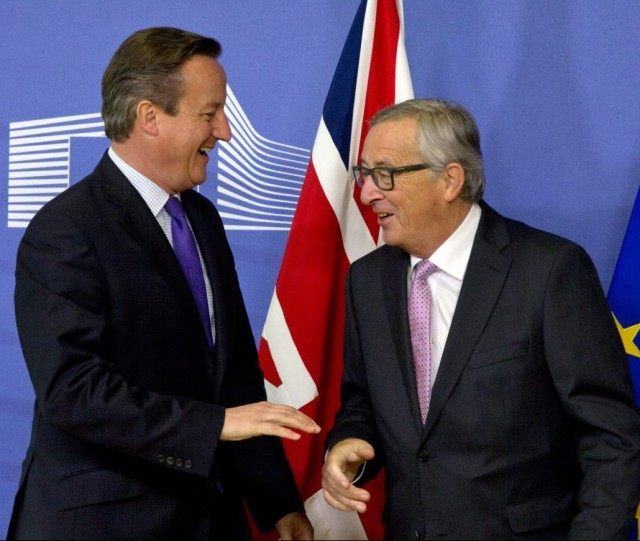British Prime Minister David Cameron said Thursday he will finally unveil his long-awaited EU renegotiation demands early next month, amid growing impatience from his European partners.
Speaking after a meeting with European Commission President Jean-Claude Juncker, Cameron said the talks ahead of a referendum that he has promised by the end of 2017 were going well.
“The pace will now quicken and I will be again setting out the four vital areas where we need change, laying down what those changes will be at the start of November,” Cameron told reporters.
“So we quicken the pace and quicken those negotiations in the run-up to the December council.”
Cameron said he would also be talking about his demands with European Union peers in Brussels later Thursday, ahead of the first formal political discussion on his plans at the December summit.
“I am confident we can get a good deal for Britain, we can fix those things that need to be fixed, and I am confident this process is getting well under way and making good progress,” he added.
Britain launched technical talks with the EU in June but there has been increasing frustration at Cameron’s refusal to spell out exactly what he wants.
EU diplomats said this week that if Cameron did not lay his cards on the table by early November, the discussion would have to be pushed back from the December summit until March.
Cameron has reportedly been unwilling to set out his demands too early in case they are savaged by eurosceptics in Britain, while at the same time he has been trying to make sure the goals are achievable in Europe.
“We need clarity on what we’re going to be discussing over the next few months,” European Parliament President Martin Schulz said on Thursday.
Juncker said on Wednesday that it “takes two to tango” and urged Britain to make its plans clear.
So far Britain has only said the demands will cover four general areas: an opt-out from the bloc’s drive for an “ever-closer union”; economic competitiveness; protecting countries that are not in the euro; and curbing welfare for EU migrants to Britain.
It has now been two and a half years since the British premier announced his plans to seek reforms of the EU and then hold an in-out referendum on Britain’s membership of the 28-nation club.


COMMENTS
Please let us know if you're having issues with commenting.